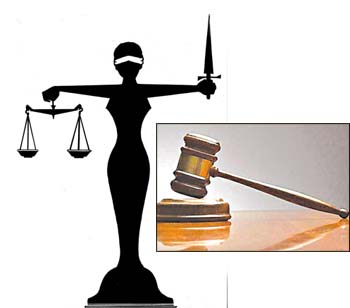|
Litigation and mediation :
Poor communication leads to disputes
 Justice
L.K. Wimalachandra - Former Judge of the Court of Appeal Justice
L.K. Wimalachandra - Former Judge of the Court of Appeal
Litigation or Court resolution of
disputes between parties has increasingly been criticized, especially
with regard to the resolution of disputes related to commercial issues,
partly because of the costs and delay involved. Very often business
disputes develop into fiercely contested, expensive and prolonged
lawsuits Part I of this article was published yesterday
When the parties resolve their disputes through mediation they are
more satisfied and are likely to comply with agreements.
Another advantage of mediation is that it gives an opportunity for
the parties to communicate better. Most disputes arise as a result of
poor communication. Mediation very often resolves all-important issues
to the parties and not only the dispute between them. Mediation leads to
a better understanding of issues affecting them, thus improving future
relations between the parties.
Even Judges appreciate mediation for the following reasons;
* Cases are resolved more expeditiously and effectively and
thereafter no judicial attention is necessary which results in reduced
judicial work;
* Some Judges may be reluctant to make decisions that affect the
lives of other people, especially the lives of children, (eg.
Matrimonial cases involving the custody of children);
* Research conducted on ADR systems like mediation have confirmed
that people are more satisfied and likely to comply with agreements
reached by them through a mediation process, as against the
determinations of Judges in Court litigation.
In a court case the pleading stage alone may take several months.
(The initial filing of the plaint, answer, replication and amendments of
pleadings). Then comes the ‘Discovery’ process. The service of
interrogatories, application for further pleadings, discovery of
documents, inspection of documents, production of documents etc. take
years. Once the case is ready for trial, fixing a date for hearing
depends on the volume of cases on the trial roll.

Very often it is difficult to get a date convenient to all parties.
It depends on the trial Judge’s calendar and the lawyers’ diary. Once
the trial commences there is no guarantee that it will be concluded
within a given time.
After a protracted trial, one party may appeal against the judgment
and the appeal may take years.
It is interesting to note that more and more European countries and
the United States in particular, encourage the parties to submit their
disputes to mediation. Bitter employment disputes between employers and
employees, family disputes, are very often referred to mediation.
English experience
In England, Judges often encourage the parties to mediate and direct
them to ‘National Mediation Helpline’ set up by the Courts Service.
ADR Alternative Dispute Resolution had grown in recent years across
the world. The contributions it might make to the fair, appropriate and
effective resolution of civil disputes were becoming increasingly
well-known.
He had recommended in his final report among four relevant
recommendations in that, if there was a satisfactory alternative in
existence to resolving disputes in Court, the Court should encourage the
use of that alternative.
Traditional methods of litigation or Court resolution of disputed has
been criticized for the following reasons.
* Very often-complicated commercial issues require expert
determination. For an instance disputes in e-commerce involving highly
technological issues require expert knowledge. However, most Judges are
not familiar with the technological aspects of e-commerce. Expert
knowledge is necessary in many of the disputes relating to technical,
economic, financial, regulatory and legal issues on the part of the
dispute resolving Judges. The Judges are not experts in those fields and
they will have to depend on experts summoned before them to give
evidence. Very often Judges are not even familiar with the many terms
used in modern technology;
* The cost of conventional litigation is prohibitive and costs of
expert and cost of data gathering is expensive. The cost of not
resolving a dispute must be well below the cost of resolving it or of
conventional legal proceedings;
* Conventional Court procedure in most cases involved delay;
* Litigation can be damaging to future business relations and
frustrating to the parties.
Dispute resolution
* Flexibility - One of the attractive features of Mediation is
flexibility. The ability of the parties to select arbitrators or
mediators who are qualified to deal with specific issues is a principal
element of flexibility. Procedures can be adopted to fit the dispute.
The arbitrator or mediator need not be an attorney and the parties
are permitted to select technical as well as legal experts. Arbitrators
or mediators may be selected for their special skill and expertise in
the field of commercial law, civil engineering or in intellectual
property etc. So that they would be able to grasp the intricate problems
in the dispute and this would save parties both time and money. Moreover
the parties can expect a sensible solution to their disputes;
* Confidentiality- Unlike in Court litigation privacy and
confidentiality is maintained. Conducting proceedings in private is
important to the parties because expert systems, agreements often
contain highly sensitive, confidential and proprietary information and
trade secrets of either or both parties. Accordingly the importance of
confidentiality is one of the advantages of arbitration and mediation as
opposed to litigation. Mediation is preferable to litigation as neither
the hearing nor the award or settlement is made public;
* Less antagonism between the parties - This will preserve the
business relationship. Mediation is more informal and relaxed than
litigation. Accordingly, mediation offers and opportunity to minimize
potential damage to the business relationship;
* Cost saving - Mediation is less costly. As it is faster, the costs
involved are considerably reduced. Mediation focuses on issues rather
than law’
* Informality - the informal nature of mediation produces several
important benefits. Informal proceedings are not burdened by detailed
and inflexible rules of procedure and as a result the tension may be
lessened. Informal proceedings may therefore increase the possibility of
facilitating a solution.
Challenges in mediation process
Most often, the mediation process fails when the parties are not
truthful. Truthfulness is the basic element in developing trust among
parties. If a party intentionally deceive the other party, the entire
mediation process will collapse.
Misleading messages create mistrust. Parties can convey deceptive
messages by means of action, inaction or even by keeping silent. If the
parties are unable to see and feel the other side’s point of view,
mediation may not work.
It is to be noted that mediation is mainly concerned with compromise.
However, certain disputes cannot be compromised and there are instances
where one party is completely at fault. In such cases a compromise may
not work when the relationship between the parties has completely broken
down.
Mediation in Sri Lanka
Mediation Boards Act No.72 of 1988 gives statutory recognition to the
concept of mediation.
The Act provides for the legal framework for institutionalizing
Mediation Boards, which have a duty to endeavor to bring the disputants
to an amicable settlement by all lawful means and to remove, with their
consent, the real cause of grievance between them so as to prevent a
recurrence of the dispute or offence.
Another initiative taken to institutionalize the process of mediation
is the Commercial Mediation Centre of Sri Lanka (CMCSL) established
under this Act aims to promote mediation and conciliation as means of
resolving commercial disputes. The centre which engages in settling
commercial disputes by mediation and conciliation also has a Code of
Conduct for Mediators.
Mediation is a process to facilitate and agreement between the
parties in conflict and to assist them in resolving their disputes.
Mediation gives people an easy and quick way to resolve their disputes.
Decisions reached in mediation are by the people in conflict themselves.
However, no mediation process can be effective if the parties are not
willing to resolve their disputes themselves. In comparison to other
methods of dispute resolution, mediation is more effective, more
flexible and less expensive and the outcome of mediation gives more
satisfaction to the parties than those who resort to litigation. Even if
the mediation may not bring about a settlement initially, the meeting of
the two hostile parties very often takes away the anger and warlike
attitude, which would ultimately leads to a narrowing down of disputed
issues and leads to a settlement.
Concluded |



